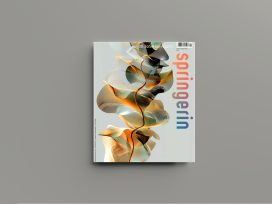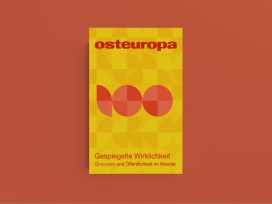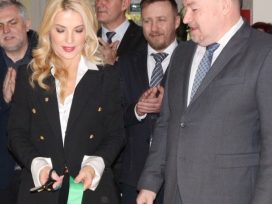Forty per cent of Mute‘s income comes from sales and sixty per cent from a basket of public subsidies at the regional, national and European levels. European funds are from partnerships across several countries as cultural and ERDF funds. In the UK the funds have moved from cultural to industry and academic RnD funds.
Financing European cultural journals
Like other types of cultural organization reliant on public funds, cultural journals throughout Europe have felt the impact of recession. In addition to funding cuts, journals are also having to negotiate the upheavals taking place in the print sector.
Through a European survey of financing for cultural journals, Eurozine takes stock of the situation of the network, in order to communicate its experiences internally and to others who hold a stake in European cultural policy today. [more]
Read the statements here:
Varlik, Turkey
Ord&Bild and Glänta, Sweden
Vikerkaar, Estonia
Wespennest, Austria
Sodobnost, Slovenia
Host, Czech Republic
Res Publica Nowa, Poland
Mute, UK
Intellectum, Greece
Blätter für deutsche und internationale Politik, Germany
Until 2011 Mute was core funded by Arts Council of England as part of its national portfolio of Regularly Funded Organizations (RFOs). This provided for a core of resources through which to develop the magazine and the organization as a whole, facilitating a certain amount of stability. However, since 2012, when the ACE cut our funding by 100 percent,
Mute has had to seek other avenues of support and has been much more oriented towards project-based funding. Public funding for
Mute currently comes from UK technology business development funds, research partnerships (with for example, Leuphana Inkubator, Leuphana University) and EU cultural funding (in collaboration with, for example
Kuda in Novi Sad and
Mama in Zagreb). Affiliate institutions support us through donations of resources and staff time on events and co-productions.
Mute does not receive funding from third-parties or private donors. Up until now we have sought to maintain our hard-won critical independence. The obligation implied by private donations and the lack of transparency towards Mute‘s reading and contributing communities would probably mean this is not a source of funding we would consider viable.
One form of funding which could be considered to fall into this category is crowd-funding. Mute has accepted anonymous donations on its website for some time. As an organization we are about to try out an experiment in crowd-funding, specifically to raise our editorial budget so as to continue to pay writers. We see this as somewhat different from soliciting large donations from single source donors or foundations, because it is as much an exercise in building closer links with our readership and community of supporters. However, the way crowd-funding “monetizes” or “valuates” these relationships is highly problematic and an aspect of the instrumentalization of social relations, commensurate with financial transactions. We would hope to make the problematic aspects of this new form of funding clear, just as we have continued to engage critical discussions on other forms of funding and directions in cultural policy.
Mute does make use of voluntary unpaid work. In the UK unpaid internships are the norm, as well as visiting international student internships as part of a study programme. We make sure that interns have an engaging programme of activity and treat the involvement as an exchange ensuring that the student has a useful learning experience in exchange for their contribution. Our own labour and that of our contributing editors could also be defined as voluntary unpaid work. All members of the editorial collective, whether paid or unpaid, contribute significant amounts of “free” work. Paying writers and editors is a high priority for Mute and this is our ring-fenced budget. We do allow writers to defer their payment if their circumstances fit and these funds go back into our writers fund.
Given that Mute received a 100 per cent defunding, one can say that austerity has hit us extremely hard. We had anticipated the cut and in some senses had even been preparing for the eventuality for several years; however with the decades-long lack of strategic vision in the UK for supporting independent intellectual and critical work, the situation is dire. The context of the Olympics in the UK only adds to the frustration, with massive government cultural spending, where artists of all types are instead engaged to project the message of hyper-capitalist conformity. Speaking from a UK perspective, the economic crisis has been used as an excuse to implement privatization policies developed by neoliberal think tanks like The Centre for Policies Studies set up by Margaret Thatcher in 1974. It comes as no surprise that its one-time head, David Willetts, is now the Universities Minister.
To quote Mute publisher Pauline van Mourik Broekman in her reaction to the ACE’s rationale for the cuts: “For us, the relevant story is elsewhere, as it has always been, and is effectively being obscured by a smoke-screen of rhetoric: it is said that ‘adventurous and risk-taking programming is being rewarded’, and a ‘resilient’ arts portfolio composed. Although we concertedly participated in the process, adapting our organization’s operational model to that demanded by ACE’s ‘Achieving Great Art for Everyone’ agenda (within which we happily chose to deliver to the Excellence and Innovation Aims), the relevant story lies in the devastation being wrought upon the social in general. Here, in the name of prudent economic management, government’s disinvestment in art and education (two fields with which Mute interfaces most intimately) appears as a symptom of a larger programme of creative destruction, launched in the name of an aggressively kickstarted, entrepreneurial Britain that we all know is doomed to fail, but not without wrecking the lives of millions.”
Even when Mute was being funded by ACE we were always on a drip-fed life support that only just meant survival – or rather, since funds were set below inflation and living costs are higher, a slow strangling death. The constant withdrawal of housing and other basic social provision is a problem for low wage cultural workers in a city like London. The current round of neoliberal social housing policies are engineered to move approximately three hundred thousand people out of Central London. As to whether a long term view can be taken, the simple answer is that this is always at the root of what the Mute editorial project is about: how to approach the question of a radical shift in politics and thinking away from the current forms of capitalism.
Turning to the question of digital publishing strategies, since 2005 all of Mute‘s content has been published as open access. Our personal use of social media is low since it requires labour time we don’t have available, but our users make plenty of good social media use of our content. This is maybe how things should be, otherwise you’re just clogging up the media people use with marketing and things they don’t want.
Like any open access publication, we get thousands more readers online than we do for the print journal, which has the adverse effect of depressing our sales. However it is more important for us to have people who read the work we support. The print component also acts as the necessary focus for well crafted, long-form writing and is one of the few things you can monetize. Since we get more readers online than we could ever get in print we can only assume that demand for long-form writing is high. Our commitment is to long-form writing has produced six and half thousand texts over eighteen years and with all of them online they continue to find next contexts and new readers.
As to whether we are advantaged or disadvantaged by the crisis of the traditional media: the answer is yes and no. The Open Web and the lack of policy to support media makers on all sides is impacting negatively on the traditional media and the small player, mainly because the net has been dominated by IPO banking culture for the last two decades. We fully support the Open Web, but without government policies to address the current distribution of value and revenue to Internet Service Providers (ISPs), the likes of Google and other data harvesting monopolies, then we are only in a race to the bottom. If you look at how ISPs charge users a monthly subscription to every household and mobile phone user of at least Euro 100 a year for content access, while Google takes all the advertising revenue for displaying other peoples’ content, then you can see how skewed the economics of the situation are.
What are our survival strategies and perspectives as a journal publisher? Mute was founded out of, and continues to hold, a desire to produce critical analyses of art and technology rooted in practice and social awareness. It conceives of itself as a “think-do-and-share” tank. Our activity spans editorial and education, tools and services development, consultancy and advocacy, and we work on an international scale. We have developed an eBook and multi-platform publishing software system called Progressive Publishing System (PPS), which is a software engine for direct conversion of editorial files to .epub and .mobi formats. We have also expanded global print-on-demand (POD) to cover India, Australia and New Zealand and connect into high-street and online distributors making use of locally printed POD and distributed copies. This results in foreign sales being possible and profitable.
What role can partnership in a network like Eurozine play in consolidating the position of cultural journals in Europe? We would say it is vital from the side of editorial work and the economics of publishing. On an economic and structural level, small organizations like us don’t have the ability to administer the organizational capacity needed to support a growing or even sustainable economy. Only a coordinated and shared set of infrastructures such as that provided by the Swedish organization Nätverkstan, where the administrative infrastructures for a hundred publishers are centralized, can have any chance of helping smaller organizations like ours. This the only European organization that we have seen doing this kind of work. If Eurozine can help us find similar projects or help propagate their type of work, that would be a vital and valuable contribution.






